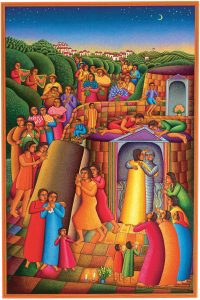Lazarus appears only once in the Gospels, Peter writes, and these verses in John 11.1-45 are a sort of curtain-raiser for what follows. The fifth Sunday of Lent is called Passion Sunday. If you are passive, then you are suffering what is done to you by an attacker, which is how it is for Jesus on Good Friday. But, of course, the word passion also means something you feel deeply about. And we are told that at the tomb of Lazarus Jesus “was greatly disturbed in spirit and deeply moved“. Then he wept.
Whether it is for stamp collecting, a football team or a person, someone’s passion tells us a lot about their character. So what does this incident tells us about the character of Jesus? What is he passionate about? In a word it is liberation. “Unbind him and let him go” he cries. Throughout the Bible that has been God’s passion – to release Israel from bondage in Egypt, from exile in Babylon and to bring them back to Jerusalem. We see the same thing in the ministry of Jesus, but on a more personal level. Lazarus, like the son of the widow of Nain and Jairus’ daughter in Luke’s gospel, are brought to life and restored to their families. So too the lepers he heals are no longer outcasts but are restored to society.
In his hymn O for a thousand tongues to sing Charles Wesley expresses it beautifully in a series of contrasts:
Hear him, ye deaf; his praise ye dumb
your loosened tongues employ.
Ye blind behold your Saviour comes,
and leap ye lame for joy.
They were all held in bondage but now they have been unbound and set free.

Take away the stone by John August Swanson
The stone that Jesus had instructed the crowd to take away is a symbol of the things that hold us back. Jesus’ passion is to take away that stone, whatever it is for each of us, that barrier preventing us from attaining all that God has intended for us. Or – to put it in more traditional language – from entering into eternal life. When Lazarus died Jesus did not to try to comfort Mary and Martha by saying, “Well now he’s gone to a better place in heaven”. As he said at the beginning of his ministry “The kingdom of heaven is within [or “among] you.” That is, we can experience the joys of heaven in this life too. That is Jesus’ passion for all of us, now.
But we must not forget the other meaning of passion. Lazarus, after all, had to die before he could receive new life. As he set off for Jerusalem, Jesus told his disciples, “If anyone would follow me, you must first take up your cross”. That is, we must leave an old life behind and enter into a new life liberated from habits and life-styles that limit our possibilities and the possibilities of others. Jesus’ passion, God’s passion, is for our wellbeing and the wellbeing of all creation.
And so, the story of Lazarus is more than a curtain-raiser. It is the key to the good news that Jesus came to bring. His passion is to bring us new life, free from the bondage of injustice, physical or mental disabilities, prejudice or hatred.
“Lazarus, come out”. These are the words that lead to eternal life.
For your prayers
for the trust that takes away all fear and brings new life;
We ask you to hear us, good Lord.
for the Church to witness to the power of resurrection and to Christ’s risen presence among us;
We ask you to hear us, good Lord.
for all hemmed in by social or political bondage, by habits and life choices that block the way that leads to hope, peace and wellbeing;
We ask you to hear us, good Lord.
for all who suffer a loss of freedom and for those who inflict it on them;
We ask you to hear us, good Lord.
for all who are striving to find ways that lead to eternal life and to turn away from all that is harmful;
We ask you to hear us, good Lord.
for all at the point of death, for all who mourn the loss of loved ones, for all who have died recently and those whose anniversaries occur at this time;
We ask you to hear us, good Lord.
We offer these prayers for the sake of him who came to bring good news and who has the words of eternal life, Jesus Christ our Saviour.






